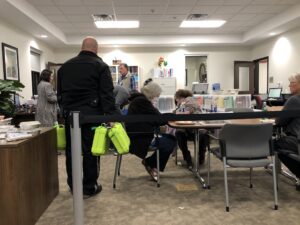
State and county election officials in Georgia are calling on the state legislature to limit no-excuse absentee balloting in Georgia. After years of touting it, the state’s top election official now says it’s just “too much to manage” in the wake of record-breaking absentee voting this year.
Currently, Georgia requires county elections officials to hold three weeks of early, in-person voting, election day voting, and unfettered, no-excuse absentee ballot voting. After the high absentee voting during this pandemic election year – and the political fallout from mail-in ballots in the state’s presidential election – Secretary of State Brad Raffensperger now says no-excuse balloting strains county resources and budgets.

(Stanley Dunlap/Georgia Recorder)
“The way Georgia’s election system is set up under law, county elections officials are essentially required to run three elections simultaneously, one each for a population that wants to vote a different way,” says Raffensperger. “For the sake of our resource stretched and overwhelmed elections officials, we need to reform our absentee ballot system.”
Raffensperger announced his intention to seek absentee reform in a press release before Christmas. Ironically, his announcement came with a message attached to it touting Georgia as a “national leader” in elections. “It was the first state in the country to implement the trifecta of automatic voter registration, at least 16 days of early voting (which has been called the “gold standard”), and no-excuse absentee voting,” the message reads.
The Secretary of State’s Office continues to tout that “trifecta” in its press releases, despite now trying to dismantle one of its key provisions.
Earlier this month, State Senate Republicans announced their intentions to eliminate no-excuse absentee voting. They also plan to introduce legislation to require photo ID to vote absentee and restrict counties from collecting ballots in drop boxes.
History of no-excuse balloting
No-excuse absentee ballot voting was passed by the Georgia legislature in 2005 and signed into law by then-Governor Sonny Perdue. According to state election figures, for years, the provision was used by between 5% and 7% of Georgia voters, with maximum absentee ballot turnout lower than 300,000 total ballots cast. Raffensperger says such a small percentage of absentee ballots was difficult but manageable for county officials.

As COVID-19 hit Georgia and the country, county elections officials had to deal with an overwhelming surge in absentee ballot voting. Raffensperger contributed to that surge by encouraging Georgians to vote by mail for public health and safety reasons. Now, he says the problems caused by the surge in absentee ballots contributed to the long lines seen during the June primaries. Voters who were able to vote in person but requested absentee ballots anyway showed up at the polls to vote in person but still had to cancel their requested ballots, slowing down voting lines.
“In light of the past few months and the overwhelming amount of paper absentee ballots that have been requested, processed and counted, I would support legislation that would require all applicants to provide a reason to receive an absentee ballot by mail,” said Paulding County Elections and Registration Supervisor Deidre Holden. “It would also help with the expense on a county budget due to the extreme cost incurred in the processing of a ballot from beginning to end.”
“Reforming Georgia’s absentee ballot request process to only those [that] have a specific need would take a large burden off of the overwhelmed elections officials here in Lowndes County and across the state,” said Lowndes County Elections Director Deb Cox.
RELATED
State lawmakers push changes after absentee ballots key in 2020 election






